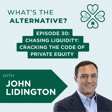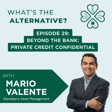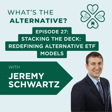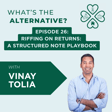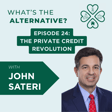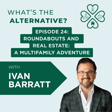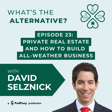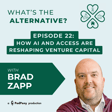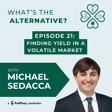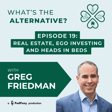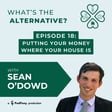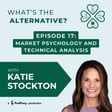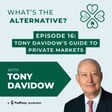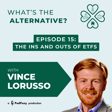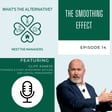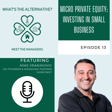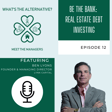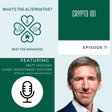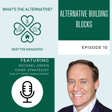Become a Creator today!Start creating today - Share your story with the world!
Start for free
00:00:00
00:00:01

What's the Alternative? | Episode 20 | The Missing Piece in Your Client Relationships with H. Adam Holt
On this episode, Shana talks with H. Adam Holt, founder of Asset-Map, a software that turns complex financial data into simple, visual maps that spark better conversations and smarter decisions. From high-net-worth planning to alternatives and family dynamics, this tool helps advisors organize everything — income, assets, liabilities, and even family relationships — in one powerful snapshot.
The result? Deeper trust, stronger multi-generational connections, and revenue that multiplies.
Connect with us!
Transcript
Financial Planning Challenges and Solutions
00:00:00
Speaker
And then of course, when, in other words, when something bad goes wrong, can you handle it financially? Or when something happens in the future, like retirement or education funding, are you on track for that?
Podcast Introduction: What's the Alternative
00:00:12
Speaker
Welcome to Bonrun Capital Management's What's the Alternative podcast. Join host Shana Orzek Sissel, the queen of alternatives and founder, CEO of Bonrun Capital Management, as she interviews leaders in the alternative investment space.
Interview with Business Expert
00:00:28
Speaker
Learn more about their firms, their passions, and about the many different ways investors can use alternative investments to add value in their investment portfolios. Welcome to What's the Alternative? We have a great episode for you today. I'm actually quite excited about it because this is somebody that I um have looked up to for a long
Introducing Adam Holt: Financial Advisor & Innovator
00:00:50
Speaker
time. Somebody who has built what I'm hoping to build here with Bonren and has a lot of experience understanding how to build and scale businesses for financial advisors like you and our audience.
00:01:04
Speaker
um and And I think that this would be a very valuable opportunity to hear about um a tool that you as advisors can use that can help you ah plan and allocate to alts in a scalable way um and understand how they fit into client portfolios, which is part of what we're trying to solve for
Adam Holt's Journey and AssetMap Creation
00:01:20
Speaker
too. So with that, I'd like to introduce H. Adam Holt, he has been a financial advisor for over 25 years, during which time he has helped build and manage his wealth management firm to over $1.2 billion in assets under management.
00:01:34
Speaker
He is known for early adoption of technology and to build trying-setting client experiences, and this is what led him to found AssetMap, which is a financial technology firm dedicated to creating an engaging visual communication tools used throughout um the customer and advisor world and now has thousands of advisors worldwide that use AssetMap and supports over 1 million consumers.
Entrepreneurial Challenges in Financial Solutions
00:02:00
Speaker
So with that, i welcome, Adam. Thank you, Shanna. Good to see you. Very good to see you as well. Last time I kind of saw you, but you were on Zoom and not in the room when I ah was at the Founders Chair back in December.
00:02:15
Speaker
But it's great to see you um and talk about your journey. As we mentioned right before we went live, on one of the reasons I'm excited to have you on the show is to do something else.
00:02:27
Speaker
a little different than what we've typically done, which is kind of talk about the entrepreneurial journey journey and finding and building solutions for advisors like the ones that listen to our podcast. um Because I used to be an advisor and you are an advisor.
00:02:41
Speaker
And I think that really brings experience into how we think about building these solutions for advisors that's unique. And so I'd love to just start there. What kind of pain points were you identifying as an advisor that made you think, I have a better solution for this than what's out there and hence to launch AssetMath?
00:03:04
Speaker
how i I don't know, you know, some things I think probably and you can relate to this, we're thinking we're a glutton for punishment, right? We want to, we feel like we have to convince people that ah they maybe should go about it differently, right? We're going to have to do a change management.
00:03:19
Speaker
But I think for us, and it probably almost like your own process at Benren is, is Once you get the feedback from the customer that they really appreciate this experience other prior experience over prior experiences, I think that gives you the validation. For us, a long time ago, i say a long time ago, because I was just talking about this recently, ah my original IP goes back to 2002 and 2004. I'm like, that's crazy, that's over 20 years.
00:03:45
Speaker
And what I realized back then is I personally had a hard time keeping it straight about all the clients complexity. all the stuff that was going on in their lives, not just the people and the trusts that they had accumulated and these entities that they had invested in, but all the all the individuals that were codependent, generation zero, generation three, generation two.
00:04:06
Speaker
um So for high net worth clients, I think what tends to cause paralysis and under management or maybe even mismanagement is the complexity of it all. And so my goal was to try to get it all on one page back in the old eight and a half by 11 days,
00:04:21
Speaker
where everything had to be printed, I started drawing out using engineering tools. Here's your life on one page. And people were just so happy to finally see their life differently, where they could ask questions and I could ask questions.
00:04:35
Speaker
And that process, which became AssetMap, Actually, i started using in my own practice back when we were broker-dealer days and in 2006 got a compliance approved and I tripled my revenue in that year and then I tripled it again and again. So three years in a row and finally realized, you know what, Shana, this was investable. So I invested my money in building a technology platform for myself and scaled it in my firm, which became
Technology's Role in Financial Advisory
00:05:00
Speaker
25 people here in Philadelphia.
00:05:02
Speaker
And then you know I showed it on a conference stage in 2012 and all of a sudden was a surprise that 20 advisors, top producers at the time came to me and said, hey, can I use this? And now you look at it, we have almost 7,000 of those advisors literally around the world. So in a sense, I think invention is, you know necessity is the mother invention. I mean, the reality is I needed to solve a problem for myself.
00:05:23
Speaker
Turns out most of us in the professional world have the same problem, just explaining complexity. And I think that's really interesting because, you know, I think whenever you look at technology that's aimed at a certain market, you have to think about ah who was the person who launched the product and what was the problem that they were trying to solve. Because as you just pointed out, it's almost always comes from a problem that was being faced by the founder.
00:05:50
Speaker
It doesn't come out of nowhere. So in your case, you were facing saying this problem. In my case with Vonran, we were also... I was personally facing this problem. I was working with advisors who wanted to build all platforms. And I was going and looking at the these legacy players and trying to like mishmash something together that would work and realizing that they weren't intended to be a solution for advisor problems. They were meant to be a solution for distribution problems for asset managers.
00:06:18
Speaker
So they were coming at it differently. And that's why i was having such a hard time making it work for the problems that I was seeing as in the advisor seat. And it sounds like that's kind of what you face too, because it's not as if these tools didn't exist previously. They just didn't exist in the manner that they did. And that's kind of the beauty of what you've done.
00:06:40
Speaker
I think we finally figured out actually what the problem really is, Shana, that is Most advisors actually, the relevance that we provide with the client is actually in the advice engagement side. And what that means to me is when I'm talking to my clients and I'm applying the original AI, which is advisor intelligence to their life in real time, that's when I earn all my trust, my confidence, ah my relationship currency, my loyalty.
00:07:08
Speaker
And so it's really helping them deal with big problems and helping them understand the problems they don't see. and And that experience is really where I think humans still have a relevance in this kind of tech enabled future of finance is really to to be a sounding board, to be a guide, to be an advocate, to be a steward ah for the client's best interests, ah whether they're financial, whether they're almost emotional, whether they're legacy or whether they're ah values based. And I think that What we're really doing today is we're really actually just enabling that conversation by just showing the facts in front of them in ah in a unique visual way.
00:07:47
Speaker
And it took us a long time to realize that that's why it was working.
Building Client Relationships and Trust
00:07:50
Speaker
Right. We just thought it was because i just needed to understand the complexity. It turned out that the clients needed to understand their own life and get permission to ask questions in a way that was going to be helpful to them. So I think the irony behind all of the things that we create when they work, we don't always know why they're working, but we if we continue to get the positive feedback that it's actually making a difference in the results and the outcomes, there's something there, we should keep exploring it.
00:08:15
Speaker
It's interesting that you say that because um one of the things i did a podcast with you two years ago, well, the management edge, as you recall, and we were talking about all this as a business development tool.
00:08:27
Speaker
And, you know, I think what you're saying right there about the relationship and having um this way to connect with the client is is at the core of what we do too, because we, we, we view all this as business development tool and a way to help Your clients invest in a way that um aligns with their personal values and passions.
00:08:48
Speaker
And Alts is really the place you can do a lot of that. you know Traditional public investing, it's it's not it's not as easy to make those connections. But to your point... Being able to visualize, that's actually why we're doing a client blueprint project where we're helping advisors take kind of an inventory of the attributes of their underlying clients, creating personas to help them understand how to communicate based on the attributes of their underlying client base and then what those types of personas are attracted to as an investment.
00:09:20
Speaker
And then using AI to help create matching scores um that will allow the advisor to find the ideas. But I think your point is... clear um As an advisor um and as a former advisor myself, one of the things that you understand is that the advisor's job isn't to run investment portfolios per se or to sell investment product so much as it's to solve long term problems.
00:09:48
Speaker
um planning problems and goal set for clients and understand what drives them and help them understand their own behavioral cues in order to have the best plan
Challenges and Innovations in Financial Advising
00:10:00
Speaker
in place to help them reach those goals. And we spend so much time talking about, did I beat the S&P 500? Did I do that? Did I do this?
00:10:07
Speaker
That we lose track of what the actual reason why that person is coming to us. And it's not because we can give them amazing investment results. Now they will fire us if we don't give them like at least market returns or like help them reach their goals, get them, keep them on track.
00:10:22
Speaker
But they aren't going to give us a reward of some sort because we crushed the S&P 500. It's just not what we're meant to be doing. So as you think about kind of the key things that help you be successful and building asset map and the feedback you've got from advisors,
00:10:41
Speaker
How is it that you were able to incorporate into your solution ways for the advisor to get to know their client better and to build on that relationship and subsequently grow their their business? That's a great question. You know, i think in the early days, the asset map was an attempt to just say, hey, I listened to you. Let me prove to you that I listened to you. here Here's all the people that are involved in your family with whom you have financial relationship or entities.
00:11:07
Speaker
Here's the income sources. Here's the assets controlled by who controls them, not just owns them but who controls the decisions around them. Here's your joint instruments. Here's your insurances. Here's your liabilities. Here's everything like a treasure map on one page. We can all read it. It's technical, but it's also consumable.
00:11:22
Speaker
And I thought that for many years, that was really, we never had to do much more than that. Because if you if you could just prove to the client, you actually listened and now got permission to explore and fix and fill and you know, bring in other expertise, legal tax, insurance, investment. Like you can, you can have a collaborative discussion, which is really where we wanted to live. Our highest revenue producing activity was actually meeting with people and helping them make decisions. Like everything else is just the business of executing that.
00:11:48
Speaker
And, and for me personally, I just wanted to spend all my time in that mode and delegate everything else. And, That was really successful. i actually sold my securities firm in 19 because I needed to to raise money for AssetMap as it got bigger and bigger. and And really, I needed to expand beyond my own capacity to finance it.
00:12:06
Speaker
um But I think even today, i've I've realized, I mentioned before, conversational financial planning is really, I think, the future of the human role in financial planning. Because I think AI and these you know next generation tools are going to really take all the analytical function off our plates. right I don't think I'm going to have to do a retirement analysis for you. I'm just going to run an AI template, and it's going to tell me how much I should save. I don't think you're going to trust it just because you trust the math or you don't.
00:12:33
Speaker
um So that's how I tend to think that the market's going. It's gonna put a lot more pressure on the humans. So for us at AssetMap, we're focusing on really the core questions, which is who, who's involved. And we bla this this built this whole like family tree visualization that advisors can now use to talk about multi-generations and forth.
00:12:51
Speaker
What, where's all your finances? Why, what are your priorities listed by, you know let's reprioritize your categories of of what you really care about live, interactively. And then, of course, when. In other words, when something bad goes wrong, can you handle it financially? Or when something happens in the future, like retirement or education funding, are you on track for that?
00:13:12
Speaker
And it turns out that the advisor is really the how. So if you think about that, that's the who, what, why, when, and a how. if
The Future of Financial Advising
00:13:20
Speaker
we can answer that as financial advisors and and visualize and and facilitate that conversation we get huge meaning and relationship gains that we you know would typically take five six meetings or years to develop so that's really where you're going to see us focus as a platform and whether in a client includes alts or private interests or venture or private equity or a you know real estate deal i brought with my brother because you know we like real estate and on the side
00:13:46
Speaker
Those things should all be accessibleibly accessible and also handleable by your technology stack, which unfortunately most of it's not. You know you know we've struggled for years to you know to have alts be represented in ah in a reasonable way, yet all our high net worth clients have alts and have had them for 50 years.
00:14:03
Speaker
So it's not so alt, is it? I mean, today this is becoming mainstream and it's it's nice to see the tech is finally catching up. Well, we're trying. And I think what you've kind of touched on there kind of speaks to something that I think is often overlooked, which is, you know, there have been surveys done by large institutions asking clients of advisors, um you know, if they felt their advisor knew them and asking them questions about their relationship with their advisor.
00:14:32
Speaker
And the vast majority of these surveys show time and time again, And that the average client doesn't feel like their advisor has done the things to help them understand them individually and their needs. And the tools that are out there don't really facilitate that.
00:14:49
Speaker
And obviously, asset does. What we do here at Bonneran is really focused on that. Because to your point, um once a client feels connected with their advisor, like their advisor understands them and their goals and their needs, that plane is not going anywhere.
00:15:05
Speaker
no matter what. And so retention becomes much higher under those circumstances. But I think also to your point is that as an advisor, that's the job, right? And so you don't have time to have those meetings and have those discussions and have some roadmap to help you have those discussions, then you're just kind of facilitating and trying to figure out the how and and not get the answers to all the other questions as you pointed out.
00:15:36
Speaker
Yeah, I mean, clearly, i i believe I believe that's all true. And I think for most of the advisors that are probably listening to this, you know, thinking they've got you know a whole suite of tools and that you know meet different needs for different clients and different episodic kind of advice strategies, or they're using a very robust financial planning tool.
00:15:56
Speaker
I think that those tools are all getting pushed into the back office. We need to do more participation with our clients, less presentation. And over the years, we were always trying to show our clients, listen, look um look how smart we are.
00:16:08
Speaker
And that's why we deserve the credibility to basically be responsible for managing the comp the capital, which is actually where I get monetized anyway. So effectively, this is a sales enablement process. And I think financial planning as a great example, right Because most of us are comprehensive, we're holistic, all these great words that show that we're thinking about the bigger strategy and tactics.
00:16:29
Speaker
But at the same time, the client's generally lost, right? The client wants to know, am I okay? And I'm probably going to trust you. And ah now can you actually
Entrepreneurial Insights: Capital and Strategic Investors
00:16:40
Speaker
empower me to help me understand my own life better. And for that, I will give you relationship currency. For that, I will refer people to you For that, I will tell my kids to make sure that when I go, you're still involved.
00:16:51
Speaker
And because a lot of advisors, I think, are not really thinking about you know what their what their client's going to look like in the next 10, 15 years, they run the risk of keep running the same exact play they've run for 100 years expecting the same exact result. and I think we're finally at the precipice of this tipping point where It's not gonna work. You can't bring the same old SMA. You cannot bring the same old index fund strategy, charge 80 basis points or more, and then expect that the next generation is gonna value that at all.
00:17:20
Speaker
So ah what are you doing different and how are you really shepherding and and really you know being a steward for the client's capital over the next 30, 40 years, even to the point of that you have actually succession and tech that's gonna engage them and empower them.
00:17:35
Speaker
Now, does AcidMap look at helping the advisor um um facilitate discussions beyond just the core client and and talk to their children and find ways to kind of bring those folks in? And if so, how did you kind of come to that and and how did you incorporate that into your solution?
00:17:52
Speaker
Well, I think, I mean, look, this the answer is yes, it totally does. And the way that it does that is a couple fold. um The relationship map that I mentioned, which is that real hoosh, can I show you a visual a family tree or any kind of mind mapping diagram that explains the people that are financially interdependent on you? In other words, typically my children,
00:18:14
Speaker
um my partner, my spouse, ah maybe my business partners. There's financial interdependencies we need to pay attention to. And then there's also generation zero, usually our parents of the clients that we have, that there's going to be some either financial obligation to care for them or some financial obligation to manage their estate and distribute it amongst the next generation and or receive it.
00:18:37
Speaker
Right. There's a lot of complexity, especially given that we think in the sandwich generation, many of the clients that we have still have living parents for which there will be financial obligation and emotional drain associated with caretaking, long term care and all this other stuff. And we can't ignore that stuff when we talk to our existing clients.
00:18:56
Speaker
And we tell them, listen, you need to do an estate plan for you to protect your children. They're going to be likely the beneficiary of an estate plan or no plan that their parents had. And and and so what we do is we actually create a map.
00:19:09
Speaker
that shows all those generations of our clients in the middle and say, what is the plan? what is that What is the parents plan? Is there complexity? Is there health? Is there wealth? Do I have to bring ideas to the table that you didn't ask me to bring in because I know from experience, if your parents go through the ringer, it's gonna be a huge stressor on you. And should I not have brought those ideas to the table?
00:19:32
Speaker
So we use asset map to bring and tee up the question of what is the plan to maximize the wealth transfer or if if that's the opportunity between these multiple generations and can we can we just build your mom and dad a treasure map can we build them an asset map it takes 15 minutes on your phone let's just make sure everybody knows where everything is they're not going to sit down for any money god bless them but i know i'm not going to get nana and pop-up to do any money but Can I get them to do an asset map? I think so. And so yes, we've we've really focused on that and delivering a client portal to all three generations that need to have access. So I think you're seeing, can we provide ways and utility for an advisor to engage multiple generations and build what I call relationship currency amongst all of them so that they're worthy of keeping that relationship at the next transition?
00:20:23
Speaker
Absolutely. And that's so important. And I think most advisors forget that. And as a woman, there's plenty of studies that show that once the husband dies, the wife almost certainly leaves the advisor. And that is continues to be an ongoing trend. So yeah this is an issue that advisors should be aware of. and having a solution like what AssetMap provides solves in many ways to make sure that the they the spouse, the partner, the children, the parents are all part of the discussion so that for generations you can continue to be the financial advisor and have those relationships.
00:20:59
Speaker
I want to slip the switch just a little bit. And I want to talk about your entrepreneurial journey. um I think if you think about most independent RAAs in a way, it's an entrepreneurial journey for them as well.
00:21:10
Speaker
um Maybe not startup technology kind of backed by investors kind of saying, but um I'd like to hear a little bit more about your entrepreneurial journey um in building AssetMap.
00:21:22
Speaker
And sort of what are the hurdles you faced over time and how you kind of worked through them. And then more importantly, now that you're kind of at a point where you're scaled and you're really established, of course, in these worlds, you're never truly really established in technology. You can go away any second if something. other player comes in with a better solution.
00:21:42
Speaker
you got to be on your toes. But with that said, um you also occasionally invest in other wealth tech kind of startups. And as you evaluate those, I know many of our advisors in our audience work at firms where they occasionally look at potential partners that are really interesting and intriguing and and think, well,
00:22:04
Speaker
What if my firm invested in them? How can that you know be um something that can add value for our clients and and the like? How do you evaluate other things with the mindset of your own journey?
00:22:18
Speaker
That's interesting. so You know, I've been lucky enough to have access. As you know, private equity, alts, et cetera, direct investments, it actually comes down to access. And I think in many ways, that's where an advisor can add a level of, I'm gonna call it exclusivity, but also, i'm not sure what the quite right word is, but there's ah there's a unique value proposition that an advisor who offers alternatives has.
00:22:50
Speaker
over someone who's offering marketable securities. And that is, you can get me in the club. you can get me in the door to this special thing. I just got a call the other day, someone said, hey, do you want access to SpaceX?
00:23:01
Speaker
and and those And I'm sure there's lots of ways to get it, but because I got that call, I might be, oh, okay, I'm inclined. Maybe I wanna do it. So I think that client advisors who offer those those kind of door opening opportunities for clients, I think clients really appreciate that.
00:23:18
Speaker
With respect to my own investments
Evaluating Startup Investments
00:23:20
Speaker
in, alternatives, it came because like you, I'm very involved in the fintech world and I come across deals and people reach out to me. um And it's actually the same thing that I used in my own journey when I decided to go the route of OPM, other people's money and not self-finance and bootstrap, which you know every company gets to a point where you're thinking, okay, I'm seriously over leveraged here. i I might own at the cap table, but i'm like my whole family own owns me because now I've made a huge investment in a single security, which we all know from financial devices, it's a risky proposition, right especially illiquid.
00:23:56
Speaker
And I think for me, when I first did that, I was i didn't know what I was doing. i i you know I'm always fumbling for it. I'm trying to figure it out as I go along. I was very blessed in a way that the way it turned out in our series B after we had taken some small institutional money,
00:24:11
Speaker
um I had to do a significant you know raise to decide, okay, what what am I going to be when I grow up? ah And I actually had a, um we had as many as 20 offers. This was back in 2021, 2022.
00:24:23
Speaker
It was a crazy time to raise money. And as an and invest as ah as ah as a CEO at the time, i it was a little overwhelming, right? Everybody's saying that you're you know worth so much. Interest rates were really low. It was a crazy tech time.
00:24:35
Speaker
ah We were seeing exits of major companies and I got disillusioned as to what valuation really was all about. And I think that's all come back to kind of to roost.
00:24:46
Speaker
But I realized how little I knew, even going back to the very beginning days, I i spent way too much money, like millions of dollars building the wrong tech. and i didn't have the right people involved in the company early because i was just trying to go it alone i didn't want anybody's opinion i'm like we're doing it my way but i didn't know what i was really doing so i i spent a lot i call it my second mba which was basically a waste of money and i'm sure you can relate to this um but i think entrepreneurs that have you know if you've got the right idea and the concept and you're and you've got the funding and the willingness to put your family through the rigor of actually being this kind of startup person
00:25:24
Speaker
um and you keep fighting. Sometimes it works and most of the time it doesn't. I think that the takeaway from that whole tirade was that at the end of the day, despite getting ah venture offers and so forth, I wound up funding the entirety of my so my Series B with network.
00:25:42
Speaker
I wound up picking up the phone and saying, I don't want to deal with these guys. They're really trying to take advantage of me now. and I don't like it and it's not the way I want to write my culture. What should I do? And they said, Adam, I'll write you check. How much you want? 100 grand.
00:25:56
Speaker
And of course, to raise millions of dollars at 100 to $200,000, not an easy thing, but it was probably the best outcome we could have received. So we wound up actually ah getting 41 investors in that round, all from industry, all fintech CEOs. And I realized something back then, which is, wow, we could actually crowdsource this if you have the right people.
00:26:16
Speaker
and And I think that's ah that's a newer model for for most of us that are starting out. So I would really encourage people to consider the people who know your product best, including your existing customers, probably want access to be part of the cap table and join the ride with you um if they know the impact that your product makes. And I think 27 of them are actual customers. So that's a bit of a review. I've never told anybody that, but that's that I think for those of you that are in that world or want to give inside access to different opportunities, it's a really great way to buy what you know and are using and paying for today.
00:26:50
Speaker
Yeah, I think that's really important advice as I'm personally and and kind of discovering on my own as we speak. I didn't start fundraising until after SPV went down and that became a significantly more difficult environment to raise money in.
00:27:07
Speaker
But to your point, um I found that those venture capitals, those private equity firms, for the most part, don't understand the space at all.
00:27:17
Speaker
And they they actually um are not the greatest partners in the world, to your point. And it's me picking up the phone and calling other folks in the industry that have had exits or have had success with their own products, to your point, FinTech,
00:27:31
Speaker
and otherwise um has been where I've gotten people saying, yeah, no, I i totally understand this problem. i totally understand how what you're doing. And again, to your point, our only venture backer to date is a firm called Kinetic Ventures.
00:27:45
Speaker
And Brad Zapp, who is the founder of Kinetic Ventures, started his career as a financial advisor. so And so he immediately understood what we're doing. And to your point, he's also customer um because he needed the service.
00:27:58
Speaker
And then he saw the value as an investor. And it's exactly what I think a lot of people miss. They get caught up in the sexiness of being able to raise capital from venture and the big venture names that are out there that they lose They lose focus on the fact that these folks can be assets to you if they're the right investors. It's not just about raising capital. it's about raising capital from the people who can help you strategically.
00:28:24
Speaker
And some founders probably don't need a million strategic investors, but having a few, I think is... incredibly important to being able to have success.
00:28:35
Speaker
And you said something really interesting. I'd love to hear if you have any anecdotal stories as it relates to this. But I heard somebody say once that the difference between startups that make it and startups that don't are that the startups that make it every time they hit any sort of like roadblock and every startup well No matter what, we'll hit some point in time where they have a cash flow issue, they need some sort of bridge, they miss payroll. It happens to every single one. This is not unique.
00:29:03
Speaker
And if you're a startup that hasn't experienced it yet, just wait, you will. Because it happens. But I think what I heard was the difference between the startups that make it and the startups that don't are the ones that work through and push through that hard part and don't just say, okay, you know what?
00:29:18
Speaker
I can't do this too hard. i give up. um And are willing to not pay themselves for a while and willing to deal with the pain that comes with that because they have the right idea and just the goal is just to push through it.
00:29:30
Speaker
Do you think that that's true? And if so, do you have any anecdotal stories of where you may have had one of those moments that you were able to push through?
00:29:40
Speaker
Yeah, I mean, I'm listening to what you said. It's been like on this journey, I think of it actually we're coming up in March. so So we joke that this is maybe our 12th year legit anniversary. But of course, it's been longer than that. I just told you that.
00:29:58
Speaker
To tell you that it's not been a bumpy
Overcoming Startup Challenges
00:30:00
Speaker
road would be a total misstatement of that. But I think the CEO founder version has to be, I don't see the bumps. I feel the bumps, but I don't see the bumps as barriers that are going to stop me. Now, that being said, I have invested in companies where the CEO is probably needed to have an exit plan or a kill criteria.
00:30:27
Speaker
A moment by ah before which they said, you know what, I think it's time to call it, right? A a fold strategy, which is never fun and always stinks.
00:30:38
Speaker
And there's other times when you need a no, I'm all in and I'm all in again. And I'm all in a third time because you know how to read your cards as opposed to just have vision. And that's always the rub.
00:30:51
Speaker
which is interestingly enough in your prior comment, private equity and venture have a very clear formula that they know they can take X and turn it into three X. And it might might require doing things that a founder led team is not necessarily comfortable or used to or experienced doing.
00:31:08
Speaker
And that change is always difficult by the way. But where as customers are like, listen, keep doing what you're already doing. I love what you're doing. And they're they're literally giving you validation to, I'm gonna invest in you because i want i don't want you to change the product. In fact, it'd be great if you could also do this and solve this other problem so I can save that.
00:31:26
Speaker
So I think it is interesting, those two different phases, but the venture in PE definitely has a role for a time at life in the business. um And they will see sometimes more of the bumps that a founder or a founder led team will see and they will be scared by them because those are potentially disruptive events. Right. That's oh we're not going to turn X into three X because we don't want to have to deal with it or we don't think the founder team knows how to deal with it. So those are those are kind of just experiences that I've had. I think, um you know, that fundraising experience back in 2022
00:32:04
Speaker
was I was I think I've told that story to many other founders in private rooms about that experience to show how difficult that can be when all of a sudden you commit to growing the company and the venture team says, yeah, we're not coming to the table on the closing day. And you're like, why? Because of some condition you couldn't control or they couldn't control and you got to scramble and you're to well, I'm not failing.
00:32:26
Speaker
So I'm going raise the money myself. um That was, yeah, that was definitely an interesting six months. So, but as I said before, I think that it wound up actually being a swan song in a sense.
00:32:39
Speaker
It was the right story ah for us that aligned our values and people. Now, you said something there, which I think is really interesting. And I think as, you know, potentially people evaluate startups and founders, you said sometimes they need to have a kill switch.
00:32:56
Speaker
What do you think is really the two or three things that if ah a startup kind of faces that you kind of have to consider that kill switch? Is it... um I got to think it's not necessarily capital per se. It has more to do with with market penetration and things of that nature. Would that be accurate? And if so, can you elaborate?
00:33:18
Speaker
It's a good question. I don't profess to be an expert at the kill criteria because I tend to be a grit believer, not a quit believer. and And if you know what I'm talking about out there, there's a book written by Duckworth called Grit, which is very popular. And there's also a book ah written by, um course, now I'm going to, called Quit by Annie Duke.
00:33:41
Speaker
And ah the contrast of those two, and Annie Duke talks about, she was a very famous poker player, She talks about and knowing what the criteria is and and one of the venture, there's a chapter in there, I can't remember which one it is, so please look it up, where she talks about ah modeling one of the top venture investors ever who helped finance helped founders like ourselves ask ourselves, what is the criteria at which time logically, if I don't hit this,
00:34:11
Speaker
it doesn't justify moving forward. And what is that? and And let's say what that is in three months, in six months, in a year. If I don't achieve X, then i will put this back on the agenda for potentially killing it. Maybe not just committing, but I might put it on the agenda so that I'm forced to be real with myself.
00:34:29
Speaker
what Well, maybe it's a family situation, right? If we can't generate x number of revenue, I can't pay the mortgage and the bank is going to make the kill switch for me. So So those are, it's really important for us to prove to also other investors that we can make good capital decisions despite our emotional connection to this project.
00:34:50
Speaker
Because that's what investors are actually investing in. they They're really giving you that, just like in a financial advice, they're giving you the capital to put it in ah with a good manager or manage it yourself so that you can be a good steward of this money.
00:35:02
Speaker
Not so that you can just wing it and be like, okay, whatever happens, happens. Like if it's true risk capital, Okay. But in most cases, I think most investors want their money back. So I think it's incumbent upon a founder who is going to say, yes, I'm going to take on capital. Other people's real hard-earned capital after tax.
00:35:20
Speaker
I'm going to make good decisions ah for the benefit of the firm, not just my vision. and And that's a hard thing to do. I have to tell you, I had to bring in a COO to basically be my, an attorney who's trained as an attorney to basically be my, you know, my bullshit caller when like, nah, that's nice Adam, but we can't afford it.
00:35:40
Speaker
So. Right. Yeah, I know I had a conversation with Dyeron Ross recently where he was like, yeah, he was a little bit of the truth serum that I needed to hear in the moment because other founders are always going to say to you, like, what you're doing borderline, you know, irresponsible, even though in your mind you're thinking like, don't know. I don't I'm looking at what I spend my money on and it's it's the bare necessities. But maybe I am paying my employees a little too much. Maybe I am offering a little too much benefit wise. Maybe I need to think about, you know, those things and determining how to balance it to ensure that we can be.
00:36:24
Speaker
successful, but also um ah good steward of capital, as you put. um and And I think that those are all things we have to deal with for sure. You want to be competitive and so you got to have good people. But then it's like this fine line between you're you're not the big guy. So you can't
Product-Market Fit and Client Needs
00:36:40
Speaker
yeah think of yourself as competing for those same people um but to help you succeed. and And that that can be a hard pill to swallow sometimes, especially in our business, where like everybody who has any talent is super expensive.
00:36:52
Speaker
um and and And that's just the nature of the business. um But I think it's a ah valuable piece of advice in that respect. um And I think that anybody who's considering starting a business or investing in a startup needs to consider the founder. And I have read that book, Grit.
00:37:08
Speaker
I love it. I consider myself a gritty person. um I look at it as a founder just candidly is are we growing a business? Is the pipeline really robust?
00:37:19
Speaker
And is lack of capital the reason I'm not able to close things as quickly or move as quickly or is lack of capital? The only thing that's keeping me alive right now is what capital I have. I'm not growing.
00:37:32
Speaker
I'm not bringing in new revenue. I don't have a pipeline. I'm losing clients, not gaining clients. i think for me, that's kind of how I look at it. As long as we continue to make strides and evolve and bring in new business and have a robust pipeline, you know lack of capital can be painful, but it's it's not going to make or break us because we have things moving. But if it was the other way around, I'd probably feel differently. I think ultimately that's what it comes down to. Do you have a product people want?
00:37:59
Speaker
Is the reason that you're not growing the way you want to because you're unable to meet up with the demand for your product? um Or is it because there is no demand for your product and basically just blowing through capital to keep yourself alive?
00:38:11
Speaker
Totally. I mean, look, product market fit is a term that that I think everyone needs to really pay attention to. Even if you're a financial advisor, do you actually have product market fit? Why is that important? Because product market fit can be scaled.
00:38:24
Speaker
If it turns out that you're the product, right, everybody's buying you as a financial advisor, One might argue that you've figured out your own personal product market fit, but are you scalable? Maybe not.
00:38:35
Speaker
And I think the same thing is true for our technology solutions or any kind of service or product that you're making today is getting to that true product market fit where you the founder can kind of step away and say, this thing actually serves a problem and doesn't really require me to be the the kind of linchpin of everything. And and that's that's what I think we're all trying to get to. In the early days, you know, our employees believe in us, believe in the leadership, believe in the vision, maybe even have equity and they conceivably are under paid for their time in real terms, but in long-term a benefit, they get career advancement and experience and all this other stuff that is immeasurable.
00:39:15
Speaker
That goes for a certain period of time until they everyone needs to get you know paid. have So ah that should be that should be the most important thing to keep important is the most important thing. And I think um I'm sure you found this too. Sometimes your product market fit is something you never expected.
00:39:32
Speaker
Yeah. ah People come to you that you never expected to come to you and and show you that your product has a market fit beyond what you even thought. um And I always find that interesting as a founder when when those moments hit where you're like, oh, wait a second.
00:39:46
Speaker
Now I even, now I, like they help me understand my product market fit better than I thought I understood it to begin with. And communicate Exactly. And exactly that and be able to communicate it, which is the key.
00:39:59
Speaker
So, you know, I know we're coming up on time and I know you're busy, so i don't want to ah take up too much more of your time, but I'd love to kind of hear when you think about the way that AssetMap solves for advisors and selfishly how that connects with alternatives ads and the way that advisors can use asset map in their alternative journey. like How does that work and how does that fit? Because not many solutions actually incorporate alternatives into the the the way that they work with the advisor.
00:40:29
Speaker
Well, I think part of this came from my my perspective on alts over any financial instrument was really not from a U.S. financial advisor centric experience. It was from a global capital control perspective. That was the benefit of working with ultra high net worth billionaires who were multi-national and they didn't think just in, do I have a a residence and a REIT and a you know some you know some private equity fund. they They actually made direct investments in these things. And we had to illustrate them as a bucket of capital that was allocated. In other words, this is a bucket of your your liquidity. This is your marketable service securities. This is an investment you made in this limited partnership that's split interest inside of a trust. And I need to represent that just as equally as I would represent a ah life insurance policy. these are
00:41:25
Speaker
That's a financial... decision with capital allocated to it. And the only question I really wanted to ever ask was, is this a capital investment intentional or not?
00:41:36
Speaker
Does it serve you or not? Is it intentional or not? And now there's all these justifications for why we're doing it. Cash flow, tax advantage, illiquidity, whatever. okay All the things, all the reasons.
00:41:49
Speaker
But I wanted a way to to challenge every status quo, which is, does this deserve to be here? Does it deserve to be there? And that means we had to be able to handle any kind of financial instrument. it just happens at alts.
00:42:02
Speaker
or illiquid assets or direct investments just fell into the category. Like i own a business, I own this company, I own stock, I own restricted stock options. i Like it doesn't really matter. And so we shouldn't create boundaries that certain certain types of financial instruments should exist on ah on a map and certain certain certain. No, everything's welcome because the next investment crypto didn't really exist at the time when it It fits perfectly, right? Okay, crypto, it's ah it's a financial instrument instrument, right?
Alternative Investments in Financial Planning
00:42:30
Speaker
It's just a choice to put capital there. So I think where where in the past, we didn't think like that. We thought, how does this apply to your retirement distribution plan?
00:42:41
Speaker
Like, i That's the wrong question, I think. The question is, where's your capital and is it idle or is it invested? Is it productive or is it haphazard? And I think when we have the opportunity to ask those questions and challenge the current state and say, hey, yeah, absolutely, it it belongs here. This is why it's here. Let's double down.
00:43:01
Speaker
That's the conversation clients really want to have, an intentional management of capital allocation, regardless of currency and regardless of language, because that's universal for all of us in in a capitalistic society. And I think that's that's why we started there.
00:43:15
Speaker
And that's a little departure for sure, but not for ultra-I-net-worth. That's the question they've been trying to answer forever. And I think now that's available to mass market. And I also think what you've done for advisors is the thing that we preach so much to Bonnery on, which is if you don't know what else your client's allocating capital to, then you're losing out the opportunity to be able to influence how they allocate that capital and potentially bring that capital to good to do the allocations and to bill on.
00:43:45
Speaker
And, um you know, ultimately, yeah the problem, then there's another problem, like how do I bill on it? And that's what we set to kind of resolve here at Bondarigan. But the point being is if you don't know how all of their capital is being allocated, then you can't influence those capital decisions and potentially bring more assets into your business to help them make better decisions on how to allocate capital to those non-traditional markets. And I think a solution like what you have with AssetMap is allows the advisor to have at least that conversation and to know what the actual net worth of their client is.
00:44:20
Speaker
Because I'm not convinced that most advisors actually do know the total net worth that they're playing because they don't ask those questions. It's true. And actually, and i would just add on to you that, it does it turns out that net worth doesn't matter.
00:44:31
Speaker
It's what capital that you control matters. I'll tell you, I could have a ah net worth of zero, but I got $100 million dollars in trust because I did good planning. My net worth's zero. And I want my net worth to be more than zero.
00:44:42
Speaker
but I wanna control $100 million of capital. Like in that distinction, or I wanna control an endowment that has $2 billion dollars in it. we We have to ask a different question, which is how much influence you have over the capital and what's your responsibility for that capital? Is it cashflow? Is it growth? Is it tax management?
00:44:58
Speaker
Is it endowment? Is it legacy, right? and And then we can start asking a better question is, does this choice to have this money in XYZ direct investment match the overall strategy or not.
00:45:12
Speaker
And if it doesn't, goodbye. And that's what you're paying for. You're paying for intelligent management and thoughtfulness to say this serves you or it doesn't. And we can't answer that question if we don't have transparency.
00:45:23
Speaker
And that's the key is let's just throw it all on the bed and figure out what deserves to stay here and what can be fixed and filled. No, I completely agree. And I wanted to just thank you for joining us today.
00:45:36
Speaker
um i appreciate all your time. i think the advisors that listen this show might be a little um surprised by the departure of like talking about the nitty gritty of investments, but I thought that this was a good conversation to have because broadly speaking, reason advisors listen to this show is because they want to stand out from their peers.
00:45:54
Speaker
They want to be able to service and support their clients in a superior way. And this really... like is part of that, that this is part of that conversation. So I want to thank you for your time.
00:46:05
Speaker
and know you're busy. It's great to have you. And um I just want to say to our audience, thank you for joining us for this episode. Again, Shana Orzek-Sitzel, the founder and CEO of Founder and Capital Management.
00:46:17
Speaker
um If you have any feedback on this episode or if there's something you want to hear about, please let us know. And don't forget to like and subscribe to ah What's the Alternative Podcast as well as Bonarine's other podcasts, The Alternative Mason, and you're doing it all wrong.
00:46:33
Speaker
Thank you so much. Until next time.
00:46:38
Speaker
The opinions expressed on the What's the Alternative podcast are for general informational purposes only and are not intended to provide specific advice or recommendations for any individual or in any specific security. This is only intended to provide education about the financial industry to determine which investments may be appropriate for you. Consult your financial advisor prior to investing.
00:47:03
Speaker
Any past performance discussed during this podcast is no guarantee of future results. The guests featured on this program are participants on Bonnerian Capital Management's platform. As such, Bonnerian may receive payment for their participation as a platform partner. Any indices referenced for comparison are unmanaged and cannot be invested into directly.
00:47:26
Speaker
As always, please remember investing involves risk and possible loss of principal capital. Please seek advice from a licensed investment professional. Investments are not FDINC insured, nor are they deposits of or guarantees by a bank or any other entity, so they may lose value.
00:47:46
Speaker
Investors should carefully consider investment objectives, risks, charges, and expenses. This and other important information is contained in the fund prospectus and summary prospectuses, which can be obtained from a financial professional and should be read carefully before investing.
00:48:03
Speaker
Statements attributed to an individual represent the opinions of that individual as of the date of the published podcast and do not necessarily reflect the opinions of Bondrian Capital Management or its affiliates.
00:48:15
Speaker
This information is intended to provide educational value, highlight issues, and should not be considered advice, an endorsement, or a recommendation. All Bonruin Capital trademarks mentioned are owned by Bonruin Capital Management Inc., an affiliated company or its funds. All other company and product names mentioned are the property of their respective companies.
